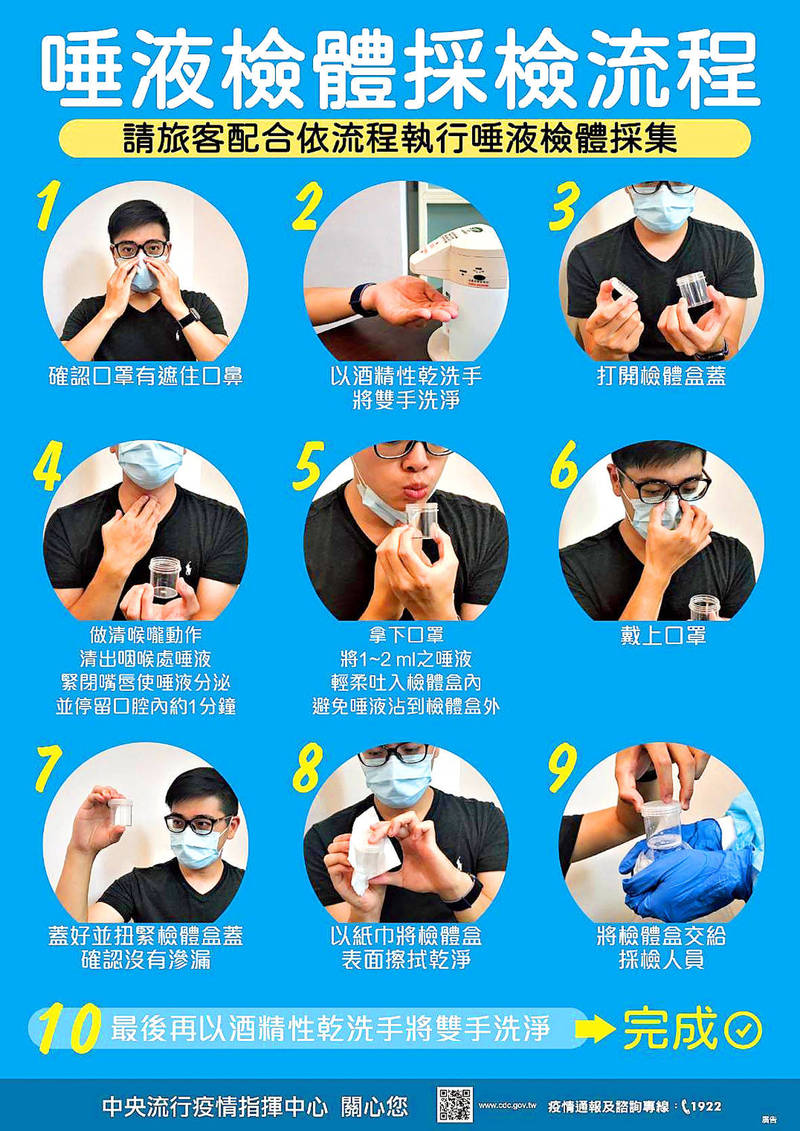《TAIPEI TIMES》 CECC changes arrival testing process

A step-by-step instruction shows how to collect deep throat saliva for COVID-19 testing. Photo courtesy of the Central Epidemic Command Center
EASIER: Deep throat saliva specimens would be taken by travelers, which would allow authorities to reduce the number of people who oversee the testing process
By Lee I-chia / Staff reporter
The Central Epidemic Command Center (CECC) has decided to change the kind of polymerase chain reaction (PCR) diagnostic tests for SARS-CoV-2 required from international travelers arriving at airports, as of tomorrow.
Health authorities would take deep throat saliva (DTS) specimens instead of throat swabs, the center said yesterday.
The CECC evaluated the efficacy of DTS tests between July 2 and Monday last week, with DTS and throat swabs collected from 1,226 travelers who were required to take a COVID-19 test upon arrival at an airport, said Centers for Disease Control (CDC) Deputy Director-General Chuang Jen-hsiang (莊人祥), the CECC spokesman
“Among the travelers who were tested, 24 people were confirmed to have COVID-19,” Chuang said.
The test results from DTS and throat swab samples were positive for 12 people, while eight more tested positive with DTS, but negative from the throat swabs, and four people were negative from DTS, but positive from throat swabs, he said.
Given that the performance of the DTS tests was not inferior to throat swab specimens, airport testing would be changed to collecting DTS specimens, he said.
The DTS specimens would be collected by travelers themselves, and would only need specialists to oversee the process, which would also decrease staffing requirements, as a physician and a nurse are currently required to perform a throat swab, Chuang said.
International arrivals who tested negative in DTS testing would still be reported for more testing if they develop COVID-19 symptoms during the mandatory 14-day quarantine, so the change would not affect the nation’s disease prevention, he added.
Separately yesterday, the CECC contacted Chinese authorities after learning that a Taiwanese had tested positive for COVID-19 in Shanghai, and received a reply at noon, Chuang said.
The person is in their 20s and lives in the US.
They had left Taiwan on July 13, 2006, and did not return until Aug. 4, he said.
The person was quarantined for 14 days after arrival, with an additional seven days of self-health management, which they completed on Tuesday last week, and two days later they left for Shanghai with family members.
The person said they had not developed COVID-19 symptoms in Taiwan or after they arrived in Shanghai, but they were asked to take a COVID-19 test due to a slightly high temperature of 37.8°C, Chuang said.
The test result came back positive on Saturday, he said.
“The cycle threshold value from the real-time PCR test on the case was above 35, and the COVID-19 antibody testing showed positive with IgG and IgM antibodies,” Chuang said.
“We suspect that the individual contracted the disease in the US,” he added.
The person claimed to have no COVID-19 symptoms and did not seek medical attention in the US, so it is likely that they were not contagious during the time they were in Taiwan, therefore the public should not worry, he said.
However, the CECC would check the person’s family members to see if they have developed any symptoms, Chuang said.
新聞來源:TAIPEI TIMES
















